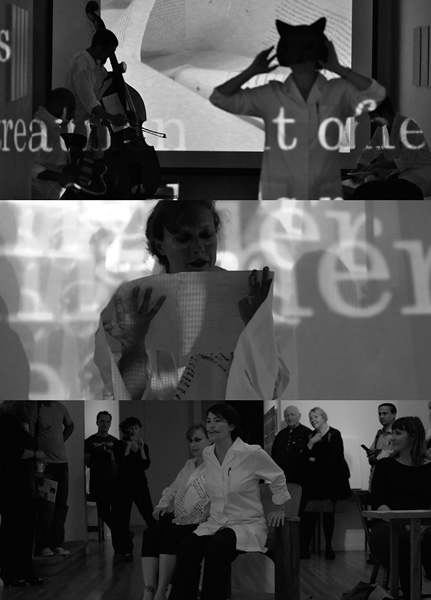
CONTAINMENT SCENARIO: PROFOUND FATIGUE
first performed on
October 22, 2011
Meridian Gallery, San Francisco, CA
performed once in 2011
FLYING DEER THEATER / M. MARA-ANN
Noah Phillips (guitar), Jason Hoopes (bass), Gretchen Jude (koto, voice), Julie Binkley (dance, voice), M. Mara-Ann (voice), Alexa Hall (live-feed videography), Melissa Lozano (live transcription), and Norman Catherine (video tech)
San Francisco, CA
784450598m784450598a784450598r784450598a784450598@784450598m784450598e784450598d784450598u784450598s784450598a784450598.784450598o784450598r784450598g
medusa.org
CONTAINMENT SCENARIO: PROFOUND FATIGUE
FLYING DEER THEATER / M. MARA-ANN
Examining the discourse around climate change and how language becomes exhausted, dull, and ineffective, “Profound Fatigue” is Flying Deer Theater’s fourth installment in the five-part “Containment Scenario” series. It was written and directed by M. Mara-Ann and utilized all three floors of the Meridian gallery. Employing a combination of stage direction, choreography, structured improvisation, live-feed videography, and live transcription, “Profound Fatigue” explores varying modes of fracturing and recombining language, sound, video, and movement to investigate how these layered visual, auditory, and haptic modes of disjunction and correspondence ultimately influence meaning, listening, and cognition. Hosting a cast of horses, bears, wolves, a mustache doctor, and a curly headed woman, the swirling narrative is adapted from the book Containment Scenario: DisLoInter MedTextId entCation: Horse Medicine (O Books, 2009).
Engaging similar techniques as contemporary music and dance with the use of improvisation and the extension of an instrument or body with innovative tools and practice, “Profound Fatigue” attempts to extend the classical reading and writing of a text through the collective engagement of performers and audience where the ideas from the written material emerge, expand, and elaborate through a collaborative intermedia exchange. Breaking the theatrical fourth wall, the audience is immersed within the performance to become part of the action, the visible, and activated “stage,” as they move freely throughout the performance space between and among the performers, are captured and layered within the live-feed and live-transcription video projections, and are engaged as active participants in the improvisational creation of material via their in-the-moment interactions with the performers and movement choices through the performance space.
In both its performance and print formats, “Profound Fatigue” is as much an investigation into the language of climate change as it is an investigation into methods for extending the “page” and how these trans-disciplinary modes of collaborative reading and writing inform, extrapolate, and reinvigorate meaning. Combining normative and non-normative structures in poetic language with intermedia performance, the performance work attempts to provide a means for navigating difficulty in language and breaking open meaning to better access complex or nebulous ideas. Embodying a core philosophy of working dynamically and creatively with both audience and performers as empowered, active agents in their own experience and co-creation of the material, “Profound Fatigue” ultimately focuses on “open” modes of discourse to question the location of meaning and to generate an equal and dynamic exchange of ideas that is collective, receptive, and constantly evolving.